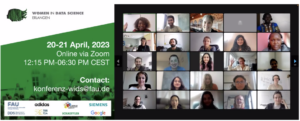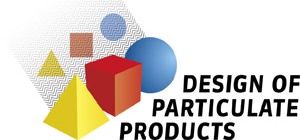Women in Data Science (WiDS) Conference, FAU Erlangen-Nürnberg, 20 – 21 April 2023
About the conference
The WiDS Conference, FAU Erlangen-Nürnberg, hosted by the FAU WiDS Ambassadors, is an independent event that is part of the annual WiDS worldwide conference, which is organized by Stanford University and held in over 200 locations around the globe. WiDS FAU addresses state-of-the-art developments in Data Science, Artificial Intelligence, and their applications in various scientific and engineering disciplines, as well as strategies for addressing related practical challenges in the industry. The conference features (1) young and advanced women data scientists who will present their recent research work and (2) workshops and special career fair sessions from the industry.
Everyone is cordially invited to WiDS, FAU Erlangen-Nürnberg, 20 – 21 April 2023, which will be held online.
Registration
Participation in the WiDS FAU Erlangen-Nürnberg is free — no conference fee. However, registration is mandatory.
Please complete the registration form here before 17 April 2023 19 April 2023. The registration deadline has now passed.
Note: The Zoom link to the conference will be shared with registered participants on 19 April 2023. If you still haven’t received a Zoom link, please contact us at konferenz-wids [at] fau.de via email.
Post-Conference Announcements
Thanks to all the speakers, participants and organisations who made WiDS Erlangen 2023 a great success!

Confirmed Speakers
Speaker: Christiane Ahlheim
Industry Talk: Modeling Media Effectiveness with LightweightMMM
Abstract: Media Mix Models (MMMs) are powerful tools to understand the contributions of different marketing channels to a business goal – but they can be hard to get right. In this talk, I will give an introduction to MMMs and the methodology underlying them, and show how our open-source package LightweightMMM can be used.
Speaker: Joy Atokple
Contributed Talk: A Baseline Visual Corpus for Speech Assessment in Ghanaian Patients with Cleft Lip and/or Palate.
Abstract: The shift in our workforce towards communication in various work areas has brought about the need to pay attention to communication disorders since they have a substantial financial impact on the world. One of the most significant causes of speech disorders is cleft lip and/or palate (CL/P), also called orofacial clefts (OFCs). There are an estimated 250,000 children born with CL/P in the world. According to literature, most people born with CL/P have some form of communication disorder even after surgery, and they must be treated by speech pathologists. However, the assessment of speech is done perceptually, making it tedious and time-consuming. In order to automate the speech assessment process with image processing techniques, it is necessary to have a baseline dataset. However, all the existing baseline datasets do not use the utterance class used for speech assessment for patients with CL/P. This work focused on creating a baseline dataset for speech assessment of patients with CL/P through annotation of the dataset, face detection, mouth segmentation, feature extraction and classification. The 68 facial landmark detector was used for face detection and mouth segmentation. Local Binary Patterns were used for the feature extraction. Finally, Random Forest, k-Nearest Neighbour and Decision Tree Classifier were used for the classification. An accuracy of eighty-one percent was obtained which establishes the fact that the visual corpus generated in this work can be used as a baseline for adequate automatic visual speech recognition. This method is robust in the face of unfavourable lighting conditions.
Speaker: Margaux Brégère
Industry Talk: Bandits for Demand Response
Abstract: As electricity is hard to store, the balance between production and consumption must be strictly maintained. With the integration of intermittent renewable energies into the production mix, the management of the balance becomes complex. At the same time, the deployment of smart meters suggests demand response. More precisely, sending signals – such as changes in the price of electricity – would encourage users to modulate their consumption according to the production of electricity. The algorithms used to choose these signals have to learn consumer reactions and, in the same time, to optimize them (exploration- exploitation trade-off). Our approach is based on bandit theory and formalizes this sequential learning problem. We propose a first algorithm to control the electrical demand of a homogeneous population of consumers and offer T^{1/2} upper bound on its regret. Experiments on a real data set in which price incentives were offered illustrate these theoretical results. As a “full information” dataset is required to test bandit algorithms, a consumption data generator based is built. In order to drop the assumption of the population homogeneity, we propose an approach to cluster households according to their consumption profile. These different works are finally combined to propose and test a bandit algorithm for personalized demand side management.
Speaker: Mine Çetinkaya-Rundel
Keynote Lecture: The art and science of teaching data science
Abstract: Modern statistics is fundamentally a computational discipline, but too often this fact is not reflected in our statistics curricula. With the rise of data science it has become increasingly clear that students want, expect, and need explicit training in this area of the discipline. Additionally, recent curricular guidelines clearly state that working with data requires extensive computing skills and that statistics students should be fluent in accessing, manipulating, analyzing, and modeling with professional statistical analysis software. In this talk, we introduce the design philosophy behind an introductory data science course, discuss in progress and future research on student learning as well as new directions in assessment and tooling as we scale up the course.
Speaker: Marie-Christine Düker
Contributed Talk: Higher-order approximation to construct confidence intervals in time series (Co-Author: Annika Betkin)
Abstract: For time series with high correlation, the empirical process converges rather slowly to its limiting distribution. Many statistics in change-point analysis, goodness-of-fit testing and uncertainty quantification admit a representation as functionals of the empirical process and inherit its slow convergence. Inference based on the limiting distribution of those quantities becomes highly impacted by relatively small sample sizes. This talk proposes a novel approach to calculate confidence intervals for the empirical process and the median based on a higher-order approximation of the empirical process. We establish the theoretical validity of our method for statistics that are functionals of the empirical process. The talk concludes with a simulation study to compare the coverage rate and interval length of our confidence intervals with classical methods.
Speaker: Ariane Fazeny
Contributed Talk: p-Laplacian Operators for Hypergraphs
Abstract: Traditional graphs are a powerful tool in modeling data and relationships between entities. They are used in image processing, machine learning or social network modeling. In case of the latter, we aim at extending the definition of differential operators and variational methods from the traditional graph setting to so-called hypergraphs and use gradient flows in the form of diffusion equations on hypergraphs to model information flow on social networks. In contrast to the traditional graph approach, we do not focus on pairwise interactions between individuals of the social network, but rather higher-order connections between multiple people. Due to the more general structure of hypergraphs, we are able to model group dynamics, such as opinion formation, realistically and include so-called opinion leaders (individuals with a large following, who hence have great impact on the beliefs of others) in our social networks. The introduced differential operators on hypergraphs are a valid generalization of the differential operators for traditional graphs and extend already existing definitions for the oriented hypergraph case such that the first eigenfunction is trivial and the second eigenfunctions therefore more easily interpretable.
Speaker: Eva Gengler
Contributed Talk: Feminist Artificial Intelligence as an answer to power imbalances in business and society.
Abstract: We live in a world full of power imbalances. People are disadvantaged among others based on their gender, skin color, and age, and thus, have very different access to opportunities and power. Artificial intelligence (AI) can reproduce and amplify these phenomena. Numerous examples of discriminatory AI already exist. In response, we present Feminist AI – an approach, value construct, and goal for greater equity with and through AI.
This talk will provide insights into the status of AI systems, discover reasons for discriminatory behavior of AI, and illustrate how feminism can resolve these challenges in a transformative manner. Moreover, it will connect research, business, and activism with a focus on current research projects, insights into the work of the think tank FemAI – Center for Feminist Artificial Intelligence, and future challenges to be tackled.
Speaker: Kanika Goel
Speaker: Jacqueline Kwiasowski
Industry Talk: Fueling the Adidas digital business with Data science
Speaker: Estelle Inack
Contributed Talk: Training Binary Neural Networks in Quantum Superposition
Abstract: Binary neural networks, i.e., neural networks whose parameters and activations are constrained to only two possible values, offer a compelling avenue for the deployment of deep learning models on energy- and memory-limited devices. However, their training, architectural design, and hyperparameter tuning remain challenging as these involve multiple computationally expensive combinatorial optimization problems. Here we introduce quantum hypernetworks as a mechanism to train binary neural networks on quantum computers, which unify the search over parameters, hyperparameters, and architectures in a single optimization loop. Through classical simulations, we demonstrate that of our approach effectively finds optimal parameters, hyperparameters and architectural choices with high probability on classification problems including a two-dimensional Gaussian dataset and a scaled-down version of the MNIST handwritten digits. We represent our quantum hypernetworks as variational quantum circuits, and find that an optimal circuit depth maximizes the probability of finding performant binary neural networks. Our unified approach provides an immense scope for other applications in the field of machine learning
Speaker: Samira Kabri
Contributed Talk: Resolution-Invariant Image Classification based on Fourier Neural Operators
Abstract: In this talk we investigate the use of Fourier Neural Operators (FNOs) for image classification in comparison to standard Convolutional Neural Networks (CNNs). Neural operators are a discretization-invariant generalization of neural networks to approximate operators between infinite dimensional function spaces. FNOs—which are neural operators with a specific parametrization—have been applied successfully in the context of parametric PDEs. We show how CNNs can be converted into FNOs and vice versa and propose an interpolation-equivariant adaptation of the architecture.
Speaker : Gitta Kutyniok
Keynote Lecture: Reliable AI: From Theoretical Foundations to Analog Computing
Abstract: Artificial intelligence is currently leading to one breakthrough after the other, both in public life with, for instance, autonomous driving or speech recognition, and in the sciences in areas such as medicine or astronomy. However, one current major drawback is the lack of reliability of such methodologies. In this lecture we will take a theoretical viewpoint towards this problem, showing the power of such approaches to reliability. After an introduction into this vibrant research area, we will focus specifically on the key areas of generalization and explainability. Finally, we will discuss fundamental limitations of in terms of computability, which seriously affects reliability, and reveal a connection with analog computing.
Speaker: Frauke Liers
Keynote Lecture: Data-Driven Optimization under Uncertainty with Engineering Applications
Abstract: For many applications, it is mandatory to determine optimized solutions that are protected against uncertainty. Stochastic optimization may have the disadvantage that the underlying probability distributions are unknown or uncertain themselves. Standard robust optimization may lead to conservative results, since solutions are determined that are feasible, regardless of how the uncertainties manifest themselves within predefined uncertainty sests. Distributional robustness (DRO) has the goal of integrating the advantages of both worlds, since it protects robustly against uncertain distributions. DRO is currently receiving increased attention. In this talk, we will review some data-driven approaches in the field and explain some recent developments that use data observations to learn more about uncertain distributions over time, along with best protected solutions, together with some applications.
Speaker: Maria Sukhareva
Industry Talk: How Siemens benefits from the latest advances in language modelling or why it is important to keep up with the state of the art
Speaker: Sowmya S Sundaram
Contributed Talk: ChatGPT and Gender Bias
Abstract: To say that ChatGPT has revolutionised NLP is an understatement. As it grows as one of the most widely used applications, it makes sense to pause and analyse the strengths, weaknesses and the appropriate applications of the same. In this talk, we will be exploring the premises for the same using the lens of gender representation in text. ChatGPT, as an application, is designed in such a way that biases of any kind are minimal. However, with careful examination, we can still expose various caveats surrounding gender bias. This is because the data on which it is trained is inherently biased. This presentation will conclude with points for safe use and pointers for responsible applications that take cognisance of underlying issues and lack of explainability.
Speaker: Poornima Vadivel
Industry Talk: From Data to Solutions: Using Machine Learning and Data Science in Industrial Problem-Solving
Speaker: Hiromi Yokoyama
Keynote Lecture: What is holding back female scientists? “Influence of the social climate”
Abstract: In STEM fields, there are fewer women in physics and mathematics-based disciplines such as engineering, information science, and physics than in biology and chemistry. We found results suggesting that this is due to ability discrimination and gender discrimination. It has been explained by (1) a male culture dominated by stereotypes of employment and competence, (2) women’s lack of childhood experiences, and (3) women’s low self-efficacy. However, we proposed (4) adding the effect of gender inequality, such as a social climate that does not welcome excellence. We tested this in Japan and England for male images in mathematics and physics. As a result, it was found that (1) was the strongest factor, but (4) also had an effect. Improving this situation requires not only removing stereotypes of employment and ability, but also promoting gender equality.
Participating Companies
Get the most out of our conference by visiting the parallel hiring booth sessions from top companies in an interactive online environment.
- Hiring Booth Lead: Jennifer Müller (Recruiter, Global Early Career Talent Acquisition)
- Hiring Booth Lead: Kilian Schlabach
- Hiring Booth Lead: Fabian Schneider
- Hiring Booth Lead: Lucia Rea
Germany´s biggest mentoring program for girls in STEM
- Hiring Booth Lead: Olivia Liebler (Mentor Recruiting)
- Hiring Booth Lead: Susanne Eichinger (Public Relations)
- Hiring Booth Lead/ Speaker: Sandra Herborg (Business Intelligence Consultant and long-term mentee)
- Speaker: Margaux Brégère (Associate Professor & Research Engineer at EDF SA)
- Speaker: Christiane Ahlheim (Data Scientist at Google LLC)
- Hiring Booth Lead: Sophie Wenzel-Teuber (Software Engineer)
- Hiring Booth Lead: Beeke Kirsch (Software Engineer)
- Hiring Booth Lead: Dana Liwschitz (HR)
- Hiring Booth Lead: Irina Büttner (Data Science Department)
- Hiring Booth Lead: Robert Robert (Data Science Department)
- Speaker: Poornima Vadivel (Data Scientist at Schaeffler AG)
- Hiring Booth Lead: Ulrike Dowie (Driving AI at Siemens Financial Services GmbH)
- Hiring Booth Lead: Sylvia Endres (Head of Analytics Lab and AI at Siemens, Nürnberg)
Program Overview (time zone is CEST)
Thursday, 20.04.2023
- 12.15 – 12.25: Opening and Welcome
- 12.25 – 13.10: Keynote Lecture: Hiromi Yokoyama
- 13.10 – 13.55: Keynote Lecture: Gitta Kutyniok
- 13.55 – 14:10: Coffee Break
- 14.10 – 14.40: Contributed Talk: Eva Gengler
- 14.40 – 15.10: Contributed Talk: Joy Atokple
- 15.10 – 15.55: Industry Talk: Maria Sukhareva – Siemens AG
- 15.55 – 16.10: Coffee Break
- 16.10 – 16.55: Industry Talk: Margaux Brégère – EDF SA
- 16.55 – 17.25: Contributed Talk: Estelle Inack
- 17.25 – 17:40: Networking
- 17.40 – 18.40: Hiring Booth (Parallel Session)
Friday, 21.04.2023
- 12.15 – 12.40: Keynote Lecture: Frauke Liers
- 12.40 – 13.05: Contributed Talk: Marie-Christine Düker
- 13.05 – 13.35: Contributed Talk: Samira Kabri
- 13.35 – 13.50: Coffee Break
- 13.50 – 14.35: Industry Talk: Poornima Vadivel – Schaeffler AG
- 14.35 – 15.05: Contributed Talk: Ariane Fazeny
- 15.05 – 15.35: Contributed Talk: Sowmya S Sundaram
- 15.40 – 15.50: Coffee Break
- 15.50 – 16.35: Industry Talk: Christiane Ahlheim – Google LLC
- 16.35 – 17.20: Industry Talk: Kanika Goel, Jacqueline Kwiasowski – Adidas AG
- 17.20 – 17.30: Networking
- 17.30 – 18.15: Keynote Lecture: Mine Çetinkaya-Rundel
- 18.15 – 18.20: Closing
Abstract submission:
WiDS FAU also invites female data science students interested in presenting their work to submit an abstract for a contributed talk.
Please submit your abstract to the conference committee via email (konferenz-wids@fau.de) by the deadline: 10 February 2023. Abstract submission is closed.
Organizers
Bathsheba Darko (Ambassador WiDS Erlangen FAU, contact: bathsheba.darko@fau.de
Aadityan R Kurungat (Co-Ambassador WiDS Erlangen, FAU)
Supraja Ramesh (Co-Ambassador WiDS Erlangen, FAU)
Marius Yamakou
More Information
Email us at konferenz-wids@fau.de
Support and Partners
Special Thanks to Dr Jens Habermann, Prof Frauke Liers and Mr Alexander Stiller for their invaluable support throughout the organisation process.
The organizers would like to thank for their contributions to the conference day: Marziyeh Mohammadi, Simon Heilig, Shreya More, Gauthami G B, Akash Kumar, Jan Kobiolka, Sreeresmi Karippurathu Ramachandran.
Verein zur Förderung der Mathematik in Erlangen



![]()
![]()


Code of Conduct: Our community values considerate, respectful, and collaborative behaviour from all participants. Read the entire code of conduct.
Follow us :





